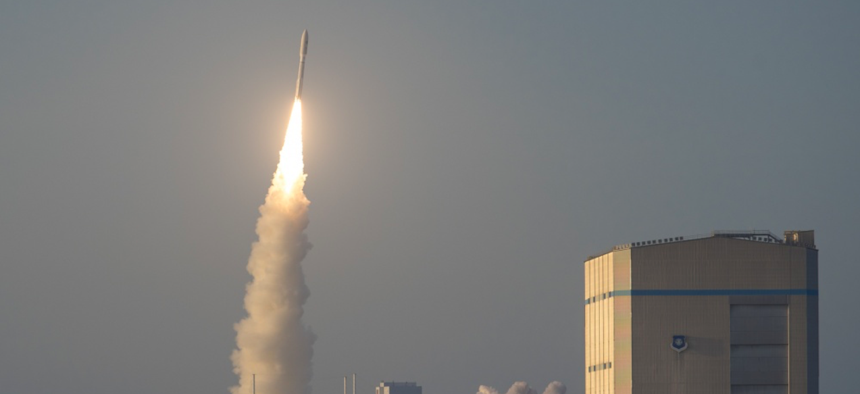
A United Launch Alliance Atlas V rocket launches into the air from Launch Complex 41 during the Air Force Space Command 11 launch at Cape Canaveral Air Force Station, Florida, April 14, 2018. Staff Sgt. Christopher Stolz/Air Force
Legislative Hurdle Delays U.S. Space Command Stand-Up
Pentagon can’t move ahead until Congress repeals a provision in the 2019 defense authorization act.
Pentagon leaders wanted U.S. Space Command, a new joint combatant command for space warfighting, up and running by the end of 2018. Two full months into 2019, Congress has yet to repeal a law that is preventing the command’s creation, according to defense and Trump administration officials.
Here’s the problem. In the 2019 National Defense Authorization Act, lawmakers ordered U.S. Space Command to be subordinate to U.S. Strategic Command, the same way U.S. Cyber Command started out under STRATCOM. But the administration wants Space Command to begin its organizational life as an independent unified command.
“The President has sent a legislative proposal...to the Congress to eliminate that requirement and allow for the moving forward with the unified combatant command,” a senior administration official said last week.
On Jan. 8, Acting Defense Secretary Patrick Shanahan asked for a “prompt repeal” of the law in a letter to Sen. James Inhofe, R-Okla., chairman of the Senate Armed Services Committee.
“Building on the lessons learned from the establishment of U.S. Cyber Command, the department determined that establishing a unified command for space, rather than a subordinate command, is a necessary step to address serious and growing national security challenges in the space domain,” Shanahan wrote. “A unified command will make our efforts in space more effective and focused, and will streamline command and control for time-sensitive operations.”
Even though the President does not need Congress’ approval to create Space Command, the NDAA language puts them in a tight spot, a defense official said.
A Senate Armed Services Committee spokeswoman could not immediately be reached for comment.
The Pentagon must still take a number of steps before it stands up the military’s 11th combatant command. Among them, President Trump must nominate, and the Senate must confirm, a four-star general or admiral to lead the command.
Right now, Pentagon officials are anticipating a confirmation hearing for the new commander in April and the command’s formal establishment in May, one defense official said.
A senior administration official said the White House anticipates sending Congress a nomination “soon.”
Last August, Pentagon officials said they wanted U.S. Space Command up and running by the end of 2018. The creation of a new combatant command for space has been widely championed by Pentagon leaders, lawmakers and outside observers, since the idea was first floated in a Defense Department report to Congress a year ago.
Air Force Gen. John Hyten, the STRATCOM commander, currently oversees military operations in space, in addition to the U.S. military's nuclear weapons.
“I care desperately about space,” Hyten said Tuesday at a Senate Armed Services Committee hearing. “But as the commander of Strategic Command, space will never be my No. 1 priority.”
Hyten, who previously served as commander of Air Force Space Command, said space ranks third on his priority list, behind operating and modernizing nuclear weapons and nuclear command and control.
“The importance of space in today’s day and age, that’s not good to have that priority,” he said. “We need a command that focuses on that. The commander of that command…must have a focus on space 24 hours a day, seven days a week and that’s why we’re standing up a Space Command.”
The location of the new command is still up in the air as well. Initially it will be located at Air Force Space Command at Peterson Air Force Base in Colorado, but local politicians have championed other locations, including Huntsville, Alabama, home of the U.S. Army’s Space and Missile Defense Command; and the Florida Space Coast, home of NASA’s Kennedy Space Center and the Air Force’s rocket-launching 45th Space Wing.
“There will be an official [Defense Department] basing study that will be done to determine the final location of U.S. Space Command,” the senior administration official said.
Even after the new command is established, Hyten expects U.S. Strategic Command to continue space duties for a while.
“Wherever it ends up, we’re going to continue to support that because we don’t know the final destination of where that’s going to be,” Hyten said. “We can’t break the mission because we have threats to deal with today.”
Katie Bo Williams contributed to this report.







